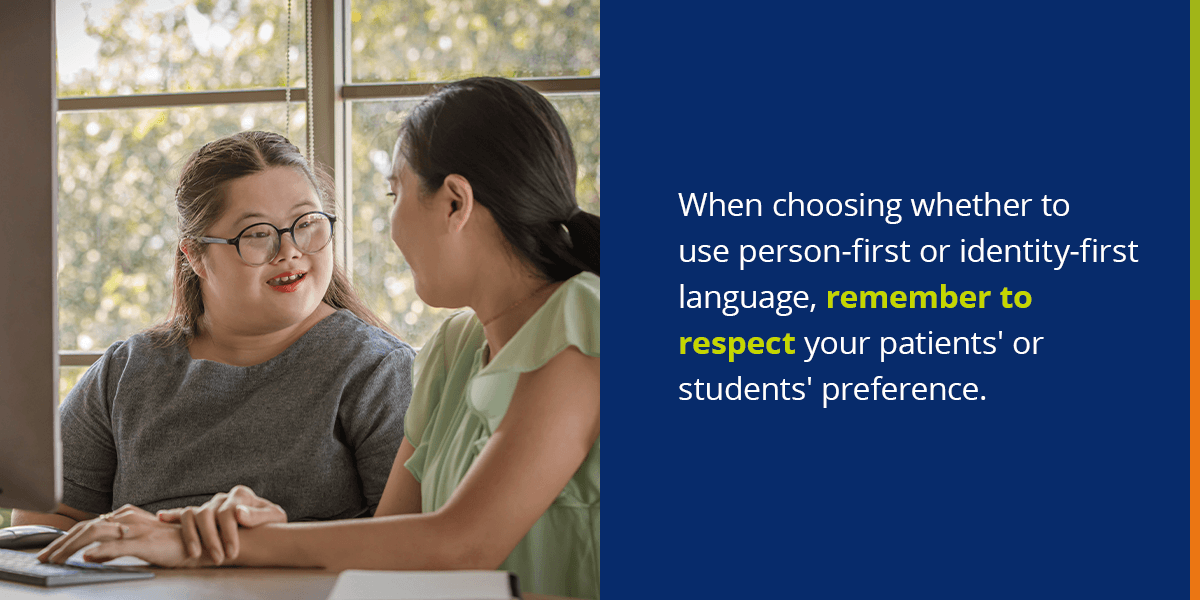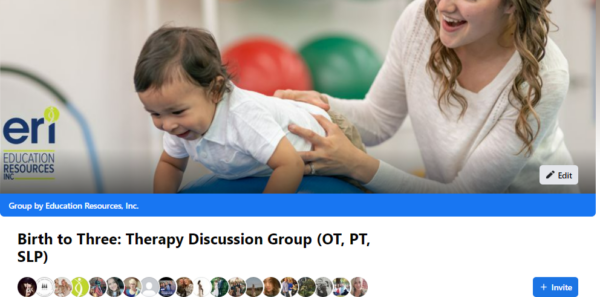
As a speech-language pathologist, occupational therapist or physical therapist, you likely work with children and adults with a wide range of disabilities, diagnoses and conditions. If so, it’s normal to feel unsure about using person-first or identity-first language and maintaining a respectful environment.
What Is Person-First Language?
Person-first language refers to emphasizing a person instead of their disability when speaking to or about them. For example, instead of saying “a disabled person,” person-first language encourages us to say “a person living with a disability.”
While the distinction may seem minor, it helps us understand that someone’s disability is not their defining characteristic and does not impact their value. With person-first language, the speaker automatically categorizes the disability as a secondary attribute rather than referring to someone in terms of their condition or diagnosis.
What Is Identity-First Language?
Identity-first language refers to speaking about people with disabilities by putting their disability first, such as saying “she is disabled” or “he is autistic.” Identity-first language is the opposite of person-first language because it names the disability as an adjective, rather than emphasizing their personhood.
While person-first language seems more widely adopted in recent years for therapists and special educators to prevent stereotyping and stigmatizing disabilities, many self-advocates prefer identity-first language because they feel it better respects neurodiversity.
Person-First Language vs. Identity-First Language Examples
Person-first language examples include:
- Person who is blind
- Person who is visually impaired
- Person with a disability
- Wheelchair user
- Person with cerebral palsy
- Person who has muscular dystrophy
- Person with epilepsy
- Person on the autism spectrum
- Person with an intellectual, cognitive or developmental disability
- Person who has multiple sclerosis
- Person with a mental health condition
- Person who has a learning disability
Identity-first language examples:
- Blind person
- Handicapped
- Wheelchair-bound
- Epileptic
- Autistic
- Suffers hearing loss
- A Deaf person
- A disabled person
- Afflicted by multiple sclerosis
- A mentally ill person
- Learning disabled
When You Should and Should Not Use Person-First or Identity–First Language
When choosing whether to use person-first or identity–first language, remember to respect your patients’ or students’ preference. As noted above, some people would rather use identity-first language for several reasons, like accepting their disability as part of their identity or reminding others that a disability is not a negative attribute. As a therapist, there’s no need to pick a side with person-first or identity-first language.

While many professional health care organizations, such as the American Medical Association, endorse person-first language, others prefer identity-first language. Some groups, such as the Deaf, blind and autistic communities, promote identity-first language. While these communities recognize the value of person-first language, they embrace their differences as an integral part of their identities.
For example, the Deaf community has made it known that they feel deafness is not a disability but rather a medical condition that does not carry a negative connotation. For example, you would not usually separate the word “beautiful” from the phrase “beautiful person” and say something like “a person who is beautiful.” Some people feel person-first language makes their disability seem like a negativity that needs to be separate from their identity.
On the other hand, many people with disabilities may think identity-first language is limiting, insensitive or stigmatizing, which is why it’s crucial to ask about their preferences. Either type of language is equally appropriate depending on what your patient is comfortable with, so if you’re unsure how to address or refer to someone, ask.
Tips for Thoughtfully Using Person-First or Identity-First Language
It can be challenging to navigate these language standards when people have different preferences. Here are some tips to help you thoughtfully and respectfully speak to and about your patients with disabilities.
- Educate yourself: The language we use when talking to and about people with disabilities is evolving. Preferences and terminologies have changed dramatically over the last decade and continue to do so. As a therapist, keep up with word choice to the best of your abilities. Ideally, you’ll want to stay informed on your patients’ specific disabilities and adjust as needed.
- Be open-minded: While your intentions may be good, everyone makes mistakes. You may misspeak if you’re switching between person-first and identity-first language for various clients. Remember to have an open mind and be willing to listen. If you’re meeting a patient for the first time, try to gauge their views and adjust your terms as necessary.
- Avoid using negative stereotypes: We want to be careful about saying anything that may unintentionally imply that a person’s disability is a negative thing. For instance, if you need to reference a person without a disability, never use terms like “normally abled” or “healthy” to describe them. These phrases make it sound as if the person with a disability is abnormal or less than.
- Ask each client about their preferences: Remember, language is always changing. If you aren’t sure, ask how a person wants you to describe them. While this may initially seem a bit awkward, it can set a tone that lets patient know you care and value their needs.
- Stay curious: Ongoing education is critical as a therapy professional. Regularly check sources like self-advocacy groups and community organizations to learn about the language they use and why.
- Avoid portraying people with disabilities as inspirational: According to the CDC, we want to avoid describing a person with a disability as “an inspiration” or “courageous” because of their differences. This framing shines a negative light on their disability and makes it appear as a hindrance or struggle to overcome.
Improve Outcomes for Your Patients and Fuel Your Passion for Therapy With Education Resources, Inc.
As a practice or school-based therapist, you’re constantly working with new patients or students and seeing the world through their eyes. The language you use during your sessions and beyond can make a significant impact and help you provide a better experience and higher standard of care to everyone you interact with. At Education Resources, Inc., it’s our goal to help therapists and speech-language pathologists rediscover their passion for patient care and learn new strategies to help improve their patients’ daily lives.
We offer various continuing education units applicable to your practice. Whether you want to learn in a real classroom, with on-demand online courses or in a live webinar, we can meet your needs and provide high-quality content taught by passionate, engaging faculty members in your field. Contact us today to learn more about creating an inclusive, respectful environment or check out our early intervention and school-based therapy courses.


 Premature and Medically Complex Neonates: Applying Critical Thinking to Support Long-term Outcomes
Premature and Medically Complex Neonates: Applying Critical Thinking to Support Long-term Outcomes

 Assessment and Treatment of Complex Feeding Disorders: Assessing and Treating The Whole Child
Assessment and Treatment of Complex Feeding Disorders: Assessing and Treating The Whole Child

 ERI is excited to announce the first annual
ERI is excited to announce the first annual 


 Don’t miss this great opportunity to learn in-person with ERI faculty and neonatal expert
Don’t miss this great opportunity to learn in-person with ERI faculty and neonatal expert  This
This  Breathe, Baby Breathe: Developmental Interventions for Infants with Tracheostomy Tubes
Breathe, Baby Breathe: Developmental Interventions for Infants with Tracheostomy Tubes Baby Beats and Breaths: Therapeutic Interventions for the Premature Infant with Cardiopulmonary Compromise
Baby Beats and Breaths: Therapeutic Interventions for the Premature Infant with Cardiopulmonary Compromise

